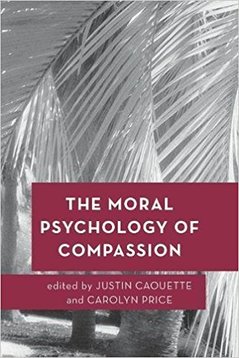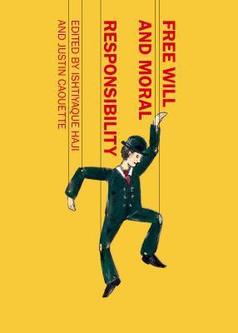Published Work
Edited Collections:
Edited Collections:

2. The Moral Psychology of Compassion (2018)
At first sight, it is hard to imagine a full account of our moral and social lives that has nothing to say about compassion. The moral value of compassion is emphasized in many religious traditions; and many moral theorists have taken compassion to play a foundational role in our moral lives. Yet there is no agreed account of what compassion is. There is disagreement, too, about compassion’s value —about how, exactly, it contributes to morally admirable or flourishing lives; what its limitations and dangers might be; and whether there are other, preferable sources of moral motivation. Finally, assuming that compassion is indeed something to be valued, we might wonder how it can be cultivated. The new essays included in this collection address different aspects of these disagreements and weigh in on the nature and value of compassion itself. Also included in this collection are: essays that explore the limitations and dangers of compassion, compassion in the context of animal ethics, the role that compassion has in the Kantian and Buddhist traditions, the role and value of compassion in particular professional contexts, and compassion understood as a virtue rather than an emotion. The authors of the essays in this volume are philosophers and psychologists who have made significant contributions to debates regarding the nature of our emotions and virtues, Kant and Buddhist scholarship, moral theory, and workplace ethics and include Alfred Archer, Bradford Cokelet, Cheryl Abbate, Aaron Cobb, Trudy Govier, David Boutland, Carla Bagnoli, Laura Ekstrom, Karsten J. Struhl, Helen Spandler, Justin M. Weinhardt and Aiden Dumaisnil. The book can be ordered here or here.
At first sight, it is hard to imagine a full account of our moral and social lives that has nothing to say about compassion. The moral value of compassion is emphasized in many religious traditions; and many moral theorists have taken compassion to play a foundational role in our moral lives. Yet there is no agreed account of what compassion is. There is disagreement, too, about compassion’s value —about how, exactly, it contributes to morally admirable or flourishing lives; what its limitations and dangers might be; and whether there are other, preferable sources of moral motivation. Finally, assuming that compassion is indeed something to be valued, we might wonder how it can be cultivated. The new essays included in this collection address different aspects of these disagreements and weigh in on the nature and value of compassion itself. Also included in this collection are: essays that explore the limitations and dangers of compassion, compassion in the context of animal ethics, the role that compassion has in the Kantian and Buddhist traditions, the role and value of compassion in particular professional contexts, and compassion understood as a virtue rather than an emotion. The authors of the essays in this volume are philosophers and psychologists who have made significant contributions to debates regarding the nature of our emotions and virtues, Kant and Buddhist scholarship, moral theory, and workplace ethics and include Alfred Archer, Bradford Cokelet, Cheryl Abbate, Aaron Cobb, Trudy Govier, David Boutland, Carla Bagnoli, Laura Ekstrom, Karsten J. Struhl, Helen Spandler, Justin M. Weinhardt and Aiden Dumaisnil. The book can be ordered here or here.

1. Free Will and Moral Responsibility (2013)
Determinism is, roughly, the thesis that facts about the past and the laws of nature entail all truths. A venerable, age-old dilemma concerning responsibility distils to this: if either determinism is true or it is not true, we lack "responsibility-grounding" control. Either determinism is true or it is not true. So, we lack responsibility-grounding control. Deprived of such control, no one is ever morally responsible for anything. A number of the freshly-minted essays in this collection address aspects of this dilemma. Responding to the horn that determinism undermines the freedom that responsibility (or moral obligation) requires, the freedom to do otherwise, some papers in this collection debate the merits of Frankfurt-style examples that purport to show that one can be responsible despite lacking alternatives. Responding to the horn that indeterminism implies luck or randomness, other papers discuss the strengths or shortcomings of libertarian free will or control. Also included in this collection are essays on the freedom requirements of moral obligation, forgiveness and free will, a "desert-free" conception of free will, and vicarious legal and moral responsibility. The authors of the essays in this volume are philosophers who have made significant contributions to debates in free will, moral responsibility, moral obligation, the reactive attitudes, philosophy of action, and philosophical psychology, and include Joseph Campbell, Christopher Franklin, John Martin Fischer, Robert Kane, Michael McKenna, Alfred Mele, Dana Nelkin, Marina Oshana, David Palmer, Derk Pereboom and Brandon Warmke.
The book can be purchased here and here.
Determinism is, roughly, the thesis that facts about the past and the laws of nature entail all truths. A venerable, age-old dilemma concerning responsibility distils to this: if either determinism is true or it is not true, we lack "responsibility-grounding" control. Either determinism is true or it is not true. So, we lack responsibility-grounding control. Deprived of such control, no one is ever morally responsible for anything. A number of the freshly-minted essays in this collection address aspects of this dilemma. Responding to the horn that determinism undermines the freedom that responsibility (or moral obligation) requires, the freedom to do otherwise, some papers in this collection debate the merits of Frankfurt-style examples that purport to show that one can be responsible despite lacking alternatives. Responding to the horn that indeterminism implies luck or randomness, other papers discuss the strengths or shortcomings of libertarian free will or control. Also included in this collection are essays on the freedom requirements of moral obligation, forgiveness and free will, a "desert-free" conception of free will, and vicarious legal and moral responsibility. The authors of the essays in this volume are philosophers who have made significant contributions to debates in free will, moral responsibility, moral obligation, the reactive attitudes, philosophy of action, and philosophical psychology, and include Joseph Campbell, Christopher Franklin, John Martin Fischer, Robert Kane, Michael McKenna, Alfred Mele, Dana Nelkin, Marina Oshana, David Palmer, Derk Pereboom and Brandon Warmke.
The book can be purchased here and here.
Published Journal Articles and Book Chapters:
7. "Recognizing the Diversity of Cognitive Enhancements" (with Walter Veit, Brian D. Earp, Nadira Faber, Nick Bostrom, Adriano Mannino, Lucius Caviola, Anders Sandberg & Julian Savulescu) American Journal of Bioethics Neuroscience 11 (4):250-253. 2020.
6. "Enhancement and Cheating: Implications for Policy in Sport" (with Allen Habib) in David Boonan (ed.), The Handbook of Philosophy and Public Policy. Palgrave Macmillan. pg 523-533. 2018.
5. "An Introduction to the Moral Psychology of Compassion" (with Carolyn Price) in Justin Caouette & Carolyn Price (eds.), The Moral Psychology of Compassion. Rowman and Littlefield. 2018.
4. “Robust Alternatives, Blame, and the Tax Evasion Case”, Southwest Philosophy Review, 31 (2): 27-32. 2015.
3. "Moral Responsibility and Psychopathy: Why We Do Not Have Special Obligations to the Psychopath" American Journal of Bioethics - Neuroscience 4 (2): 26-27, 2013.
2. "Perception of Addiction and It's Effects on One's Moral Responsibility" (with David Boutland) American Journal of Bioethics - Neuroscience 4 (3): 43-44, 2013.
1. "Introduction: Mapping the Terrain" (with Ishtiyaque Haji) in Ishtiyaque Haji & Justin Caouette (eds.), Free Will and Moral Responsibility. Cambridge Scholars Press. 1-25, 2013.
Symposium Articles
1. "On The Moral Permissibility of Passive Moral Enhancement", Neuroethics Symposium On Focquaert & Schermer, “Moral Enhancement: Do Means Morally Matter?” 2015. (paper can be found here and symposium can be found here along with an author response).